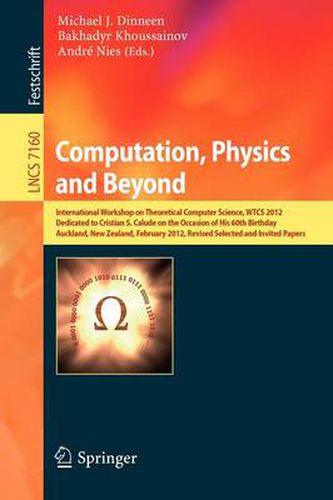Readings Newsletter
Become a Readings Member to make your shopping experience even easier.
Sign in or sign up for free!
You’re not far away from qualifying for FREE standard shipping within Australia
You’ve qualified for FREE standard shipping within Australia
The cart is loading…






This title is printed to order. This book may have been self-published. If so, we cannot guarantee the quality of the content. In the main most books will have gone through the editing process however some may not. We therefore suggest that you be aware of this before ordering this book. If in doubt check either the author or publisher’s details as we are unable to accept any returns unless they are faulty. Please contact us if you have any questions.
This Festschrift volume has been published in honor of Cristian Calude on the occasion of his 60th birthday and contains contributions from invited speakers and regular papers presented at the International Workshop on Theoretical Computer Science, WTCS 2012, held in Auckland, New Zealand, in February 2012.
Cristian Calude has made a significant contribution to research in computer science theory. Along with early work by Chaitin, Kucera, Kurtz, Solovay, and Terwijn his papers published in the mid-1990s jointly with Khoussainov, Hertling, and Wang laid the foundation for the development of modern theory of algorithmic randomness. His work was essential for establishing the leading role of New Zealand in this area.
The research interests of Cristian Calude are reflected in the topics covered by the 32 papers included in this book, namely: algorithmic information theory, algorithms, automata and formal languages, computing and natural sciences, computability and applications, logic and applications, philosophy of computation, physics and computation, and unconventional models of computation. They have been organized into four parts. The first part consists of papers discussing his life achievements. This is followed by papers in the three general areas of complexity, computability, and randomness; physics, philosophy (and logic), and computation; and algorithms, automata, and formal models (including unconventional computing).
$9.00 standard shipping within Australia
FREE standard shipping within Australia for orders over $100.00
Express & International shipping calculated at checkout
This title is printed to order. This book may have been self-published. If so, we cannot guarantee the quality of the content. In the main most books will have gone through the editing process however some may not. We therefore suggest that you be aware of this before ordering this book. If in doubt check either the author or publisher’s details as we are unable to accept any returns unless they are faulty. Please contact us if you have any questions.
This Festschrift volume has been published in honor of Cristian Calude on the occasion of his 60th birthday and contains contributions from invited speakers and regular papers presented at the International Workshop on Theoretical Computer Science, WTCS 2012, held in Auckland, New Zealand, in February 2012.
Cristian Calude has made a significant contribution to research in computer science theory. Along with early work by Chaitin, Kucera, Kurtz, Solovay, and Terwijn his papers published in the mid-1990s jointly with Khoussainov, Hertling, and Wang laid the foundation for the development of modern theory of algorithmic randomness. His work was essential for establishing the leading role of New Zealand in this area.
The research interests of Cristian Calude are reflected in the topics covered by the 32 papers included in this book, namely: algorithmic information theory, algorithms, automata and formal languages, computing and natural sciences, computability and applications, logic and applications, philosophy of computation, physics and computation, and unconventional models of computation. They have been organized into four parts. The first part consists of papers discussing his life achievements. This is followed by papers in the three general areas of complexity, computability, and randomness; physics, philosophy (and logic), and computation; and algorithms, automata, and formal models (including unconventional computing).